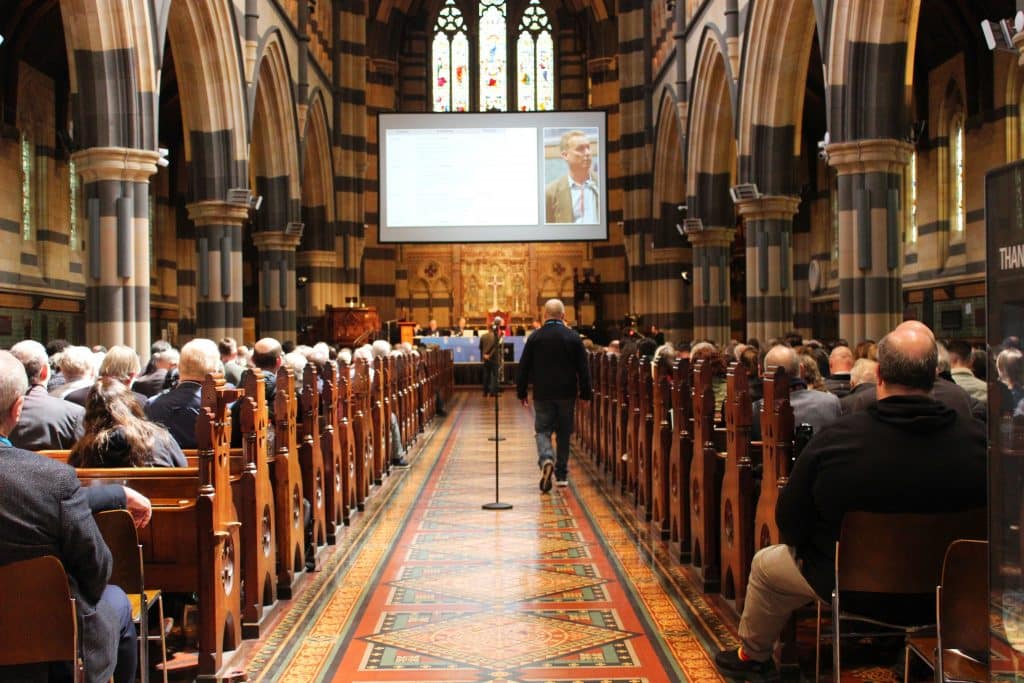
15 October 2022
4:40pm
That’s a wrap for Melbourne Synod 2022. We’ve even finished with a bit of time to spare, and no session on 3 December.
Thanks for reading The Melbourne Anglican’s live blog, we hope you enjoyed it. We’ll follow up a bit of the action on Monday, but here’s a wrap of the key points of this year’s Melbourne Synod.
- Archbishop election – The synod passed the Archbishop Election Act 2022.
- Lay representation – Authorised Anglican Congregations will be able to have equal lay representation at synod as traditional parishes, after the passing of the Synod Amendment Act 2022.
- Clergy conditions – Synod passed The Clergy Act 2022, more on that here.
- The Anglican Diocese of Melbourne’s budget – the synod agreed to receive the budget, but also a motion on “Balancing the Diocesan Budget”. This asked Archbishop in Council to reconsider the 2022 budget, looking at ways to bring expenditure in line with income – while preserving ministry as much as possible. It did so noting a deficit of $1,480,000 across the diocese, the Anglican Development Fund and the Melbourne Anglican Diocese Corporation – and the absence of a plan to return the budget to surplus. This last part possibly also passed with the phrase “in the synod documents” contained in it – we’ll double check when the synod documents are released for tonight.
- The property strategy – this called on Archbishop in Council to form a strategy for better allocation of assets of the church to ensure that the word of God is preached and the sacraments duly administered in compelling and outward-looking congregations throughout the diocese. It requested the council report back on that acts done in this matter at the next synod. The motion was brought by the Reverend Dr Andrew Judd – who wrote on the topic for The Melbourne Anglican in February – and seconded by the Reverend Angela Cook. Synod passed with an amendment relating to the dispossession of Aboriginal people from the land.
- Prevention of Violence Against Women – A motion welcoming the Family Violence Policy, Procedures and Guidelines – and encouraging parishes and agencies of the diocese to make use of these guidelines. We also had a presentation on Safe Ministry – which you can watch below.
- Gender equity and gender disparities – On Thursday delegates passed a motion committing to targets for representative equality within leadership and governance at all levels in the diocese. On Wednesday, synod requested Archbishop in Council investigate the causes behind the disparity in the numbers of men and women in full time stipended roles.
- Pathways for the continuing professional development of clergy, and the next generation of vocational ministry – Two separate motions touching on some similar issues. The first motion requested Archbishop in Council assess the efficacy of programs for identifying, training and equipping clergy, and submit an interim report to synod in 2023. The second noted the pressing need to communicate the gospel, the challenges around Australia to raise up the next generation of vocational ministers, and the alarming number of vacant parishes in Melbourne. It called on the synod to commit itself to pray that the Lord of the harvest would raise up new workers for vocational ministry in Australia and overseas, asked bishops, clergy and lay leaders to see themselves as talent scouts to identify and nurture future clergy, and requested all clergy preach once a year to call on parishioners to consider vocational ministry.
- And several acts were passed, including the Constitution Amendment (Mandatory Suspension) Canon 2022 (Assent) Act 2022, Constitution Amendment (Mandatory Deposition) Canon 2022 (Assent) Act 2022, the Episcopal Standards (Child Protection) Amendment Canon 2022 (Adoption) Act, the Safe Ministry Legislation Amendments Canon 2022 (Adoption) Act 2022, and the Diocesan Legislation Amendment (Conduct of Synod, Electronic Meetings and Other Matters) Act 2022.
You can find our coverage below:
- Some synod questions ‘manifestly out of order’ | Synod day 1
- 2022 Presidential Address to the Melbourne Synod
- Motion on biblical marriage withdrawn | Synod day 2
- Archbishop Election Bill – ‘Cleaner, clearer, fairer’? | Synod day 3
- Review for clergy legislation ‘out of date’ with needs
4:20pm
The certified Clergy Act 2022 has been passed by synod, as have a few other acts. We’re now getting towards the end of proceedings, coming to the Synod Honours List to which Bishop Kate is speaking.
Bishop Paul Barker has thanked God for the lives and contributions of members who have passed away during the year.
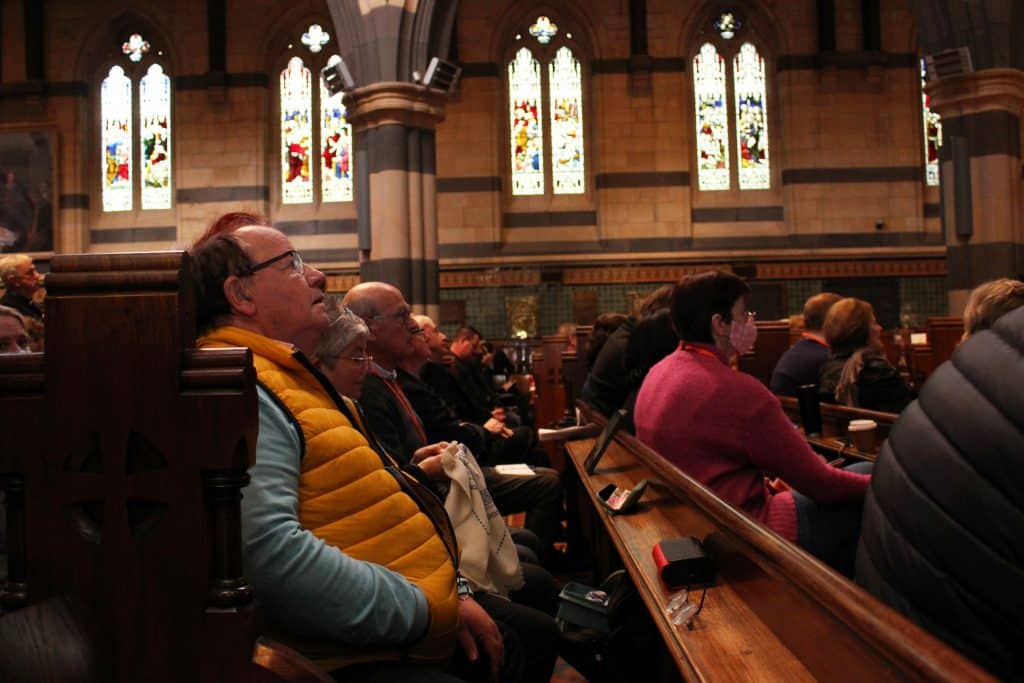
Attendees at the final day of Melbourne Synod at St Paul’s Cathedral. Image: Elspeth Kernebone. 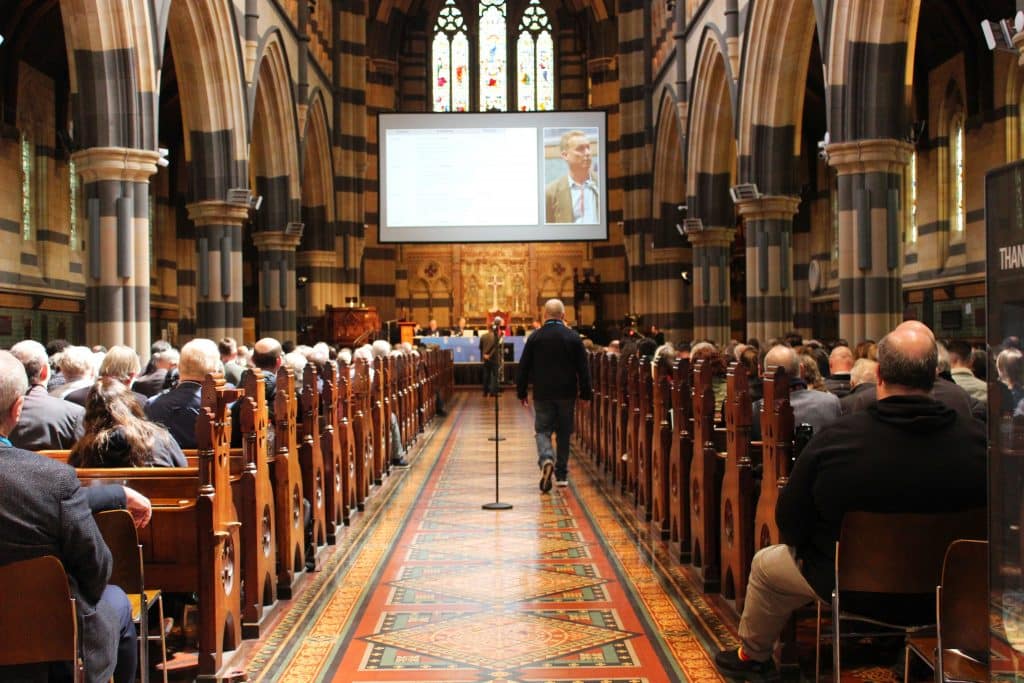
Proceedings at the final day of Melbourne Synod at St Paul’s Cathedral. Image: Elspeth Kernebone. 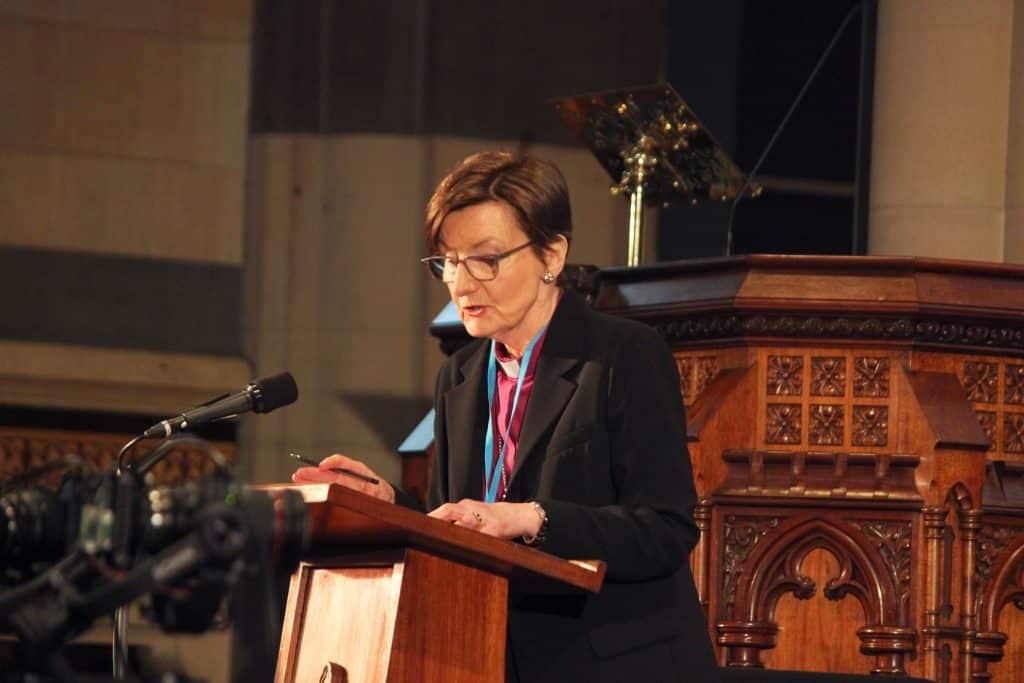
The Right Reverend Dr Alison Taylor. Image: Elspeth Kernebone. 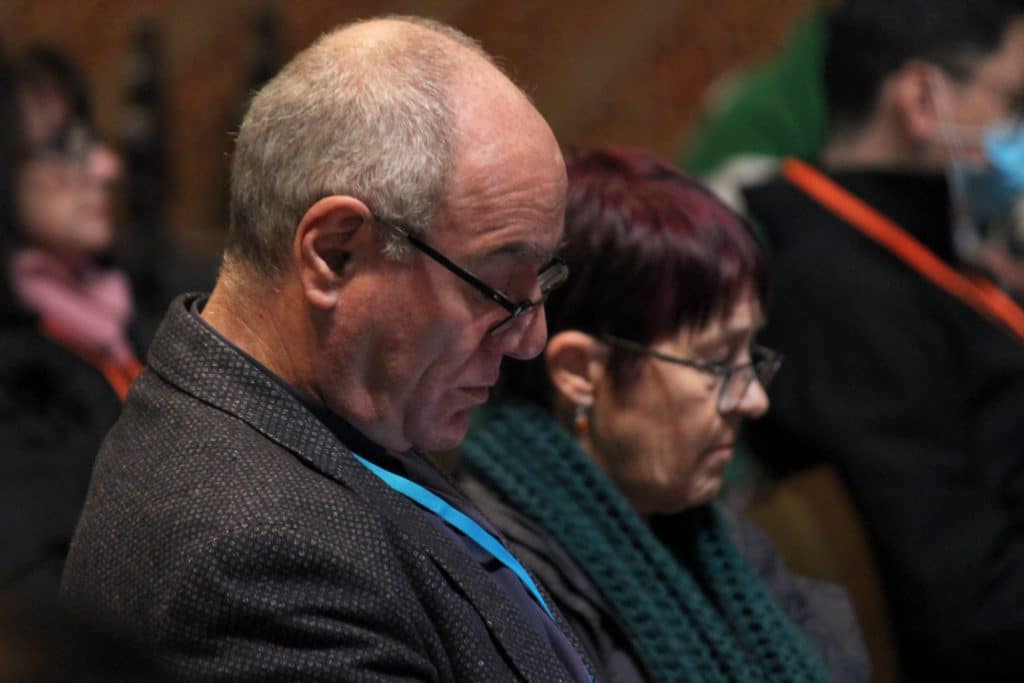
Attendees at the final day of Melbourne Synod at St Paul’s Cathedral. Image: Elspeth Kernebone. 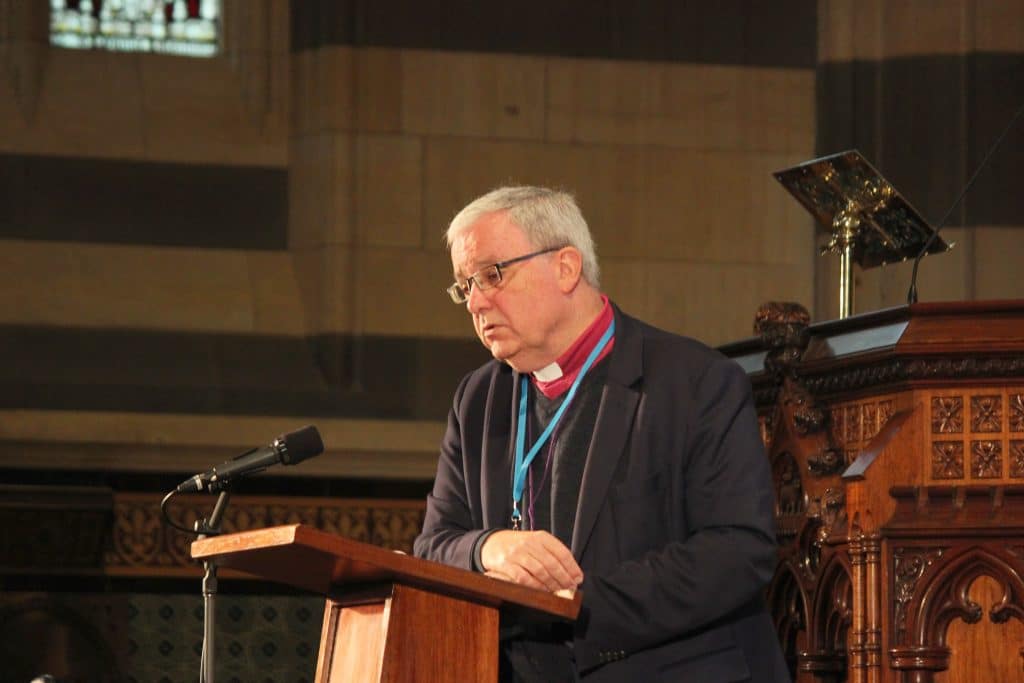
The Right Reverend Dr Paul Barker. Image: Elspeth Kernebone. 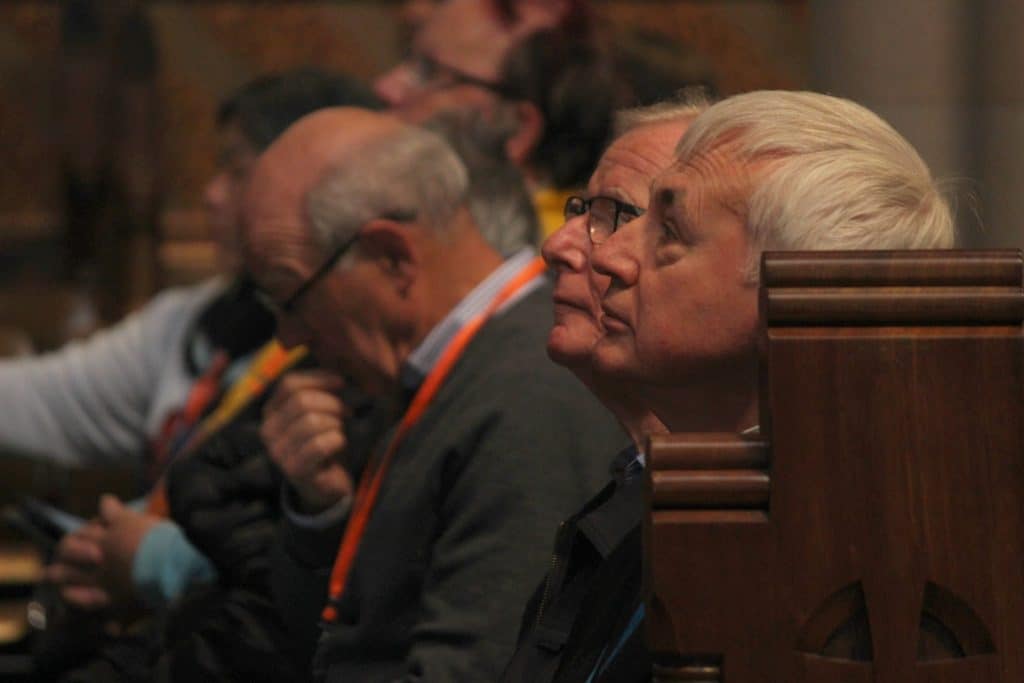

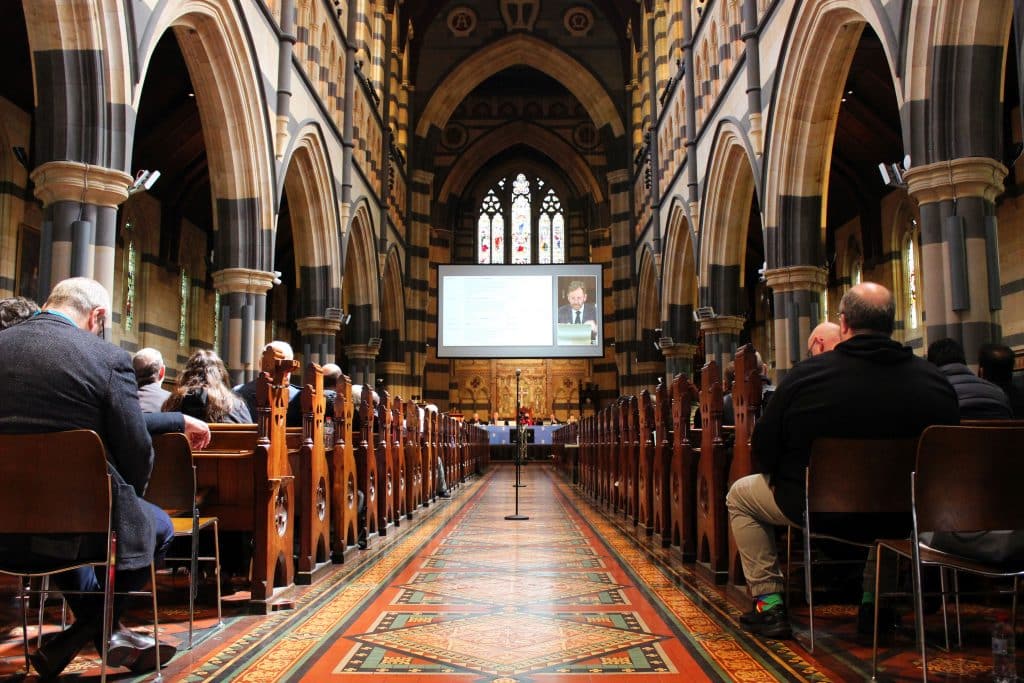
Bishop Brad Billings has thanked the contributions of everyone involved in preparing synod.
4:15pm
Churches without property will have the same representation at synod as those with property, after the Synod Amendment Bill 2022 passed. This will increase representation of Authorised Anglican Congregations.
4.12pm
In reference to Sophie Watkins’ question, Dr Judd said it was an important principle to avoid linking representation with ability to pay parish assessment.
He said Authorised Anglican Congregations did pay assessment, but some newer ones received concessions in the same way some parishes received concessions.
3.50pm
The Reverend Dr Andrew Judd is speaking to the Synod Amendment Bill 2022. Dr Judd has pointed out that Authorised Anglican Congregations only have one lay representative in synod – compared to parishes with property.
Dr Judd said this made sense when Authorised Anglican Congregations began, as people were a bit unsure of them.
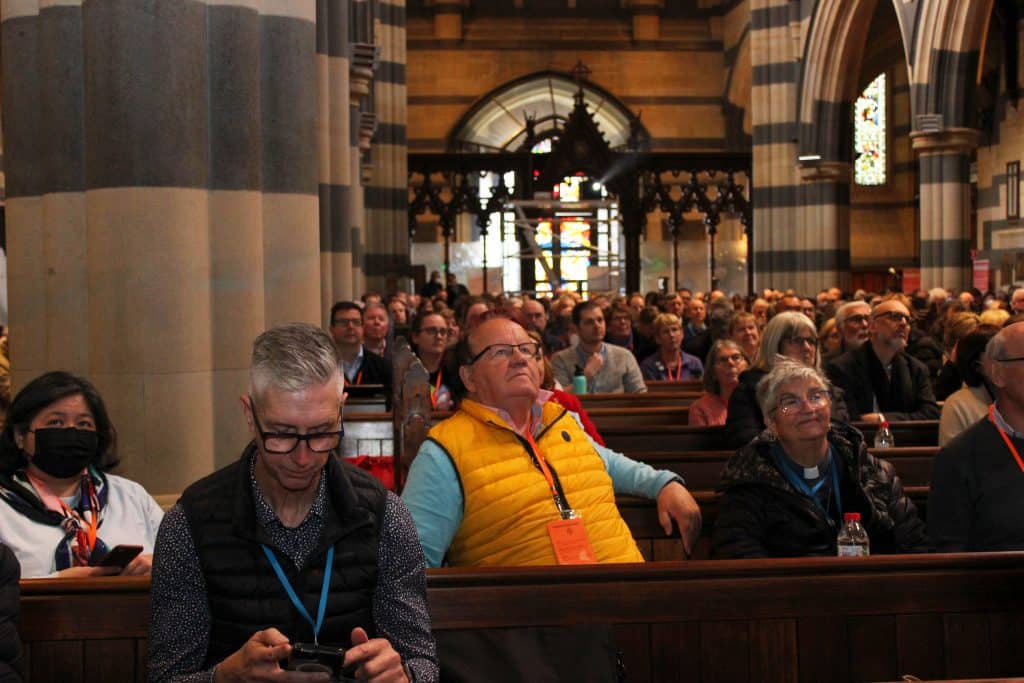
But Dr Judd said giving Authorised Anglican Congregations the same representation as parishes with property signalled acceptance of their membership of the Anglican church.
The Synod Election Bill would amend the 1975 Synod Act to give congregations without property the same representation as parishes with property.
Seconder Emmanuel Iranian Anglican Church’s Hoda Ameri also spoke in support of the motion.
Several speakers have spoken in support of this motion.
Parish of the Parks’ Sophie Watkins is speaking against the motion, saying “I don’t want to speak against this motion, but I’m going to”.
She’s asked whether Authorised Anglican Congregations pay assessment, saying she’s opposed to the amendment, and this was why.
Trinity College and St Paul’s Fairfield representative Dr Chris Porter spoke in support of the bill, said this was a matter of diversity and representation. He said the motion would increase the representation of diverse congregations within the city.
“We need to be able to see more culturally diverse clergy and laity in this synod,” Dr Porter said.
“The word of God is not a white majority, it is for everyone.”
For context, currently parishes with two or more full-time licensed clergy on their staff, and which have paid their parish assessment in full, are entitled to apply to Archbishop-in-Council to elect an additional representative.
3:40pm
The bill will be considered in committee now by the synod.
Lay delegate Alex Milner has proposed three amendments to this bill – that’s the Interpretation of Diocesan Legislation Amendment (Communicant member) Bill if you’ve lost track – which he’s now speaking to. He thinks there’s probably bit more work to be done, but it’s lawyers work to be done by closed doors to avoid boring everyone.
3:35pm
Diocesan advocate Ian Gibson has spoken to a bill relating to the interpretation of the language “Communicant member” in diocesan legislation. Dr Gibson moved this bill, which was seconded by Bishop Paul Barker.
This has been spoken of as a clarification of the existing legislation.
The explanatory memoranda of the bill speak of it as “good housekeeping” regarding synod legislation. These memoranda says the bill is not intended to change the policy, substance or intent of existing legislation.
“It corrects mistakes that have been identified, addresses inconsistencies in how terms are
used, and repeals legislation that has become supersede,” the memoranda read.
3:25pm
The Archbishop Election Act has passed in both the houses of clergy and houses of laity. It’s surprised me how quickly this one went: about 45 minutes compared to the Clergy Act which took several hours.
We’re moving on now to the synod amendment bill.
Read more:
- Online start for Melbourne Synod 2022
- 2022 Presidential Address to the 2022 Melbourne Synod
- The Archbishop Election Bill – ‘cleaner, clearer, fairer’? Melbourne Synod Day 3
- Motion on biblical marriage withdrawn
3:20pm
Apologies! I think I pre-called the previous suggested amendment about 3.10pm – this amendment has now been lost. The clause will stand part of the bill.
Several people spoke against this proposed amendment which would see the Diocesan Bishops of the Province of Victoria elect an archbishop – a common theme was that it would remove a popular mandate.
3:10pm
An amendment which would see the Diocesan Bishops of the Province of Victoria elect an archbishop if the board of electors was dissolved has just been lost. This one was put by Colin Reilly.
3pm
Hello! Melbourne Anglican editor Elspeth Kernebone here to take you through to the end of the day. We’re up to the Archbishop Election Bill, after spending most of the day discussing the Clergy Bill.
Synod has just voted down an amendment to clause 6, subclause 1 put by lay delegate Alex Milner which would institute a Board of Electors with six female clergy, six male clergy, six female lay members, and six male lay members.
Without the amendment, the bill states merely that the board would be composed of 12 clergy and 12 lay members. Synod passed the bill in this form.
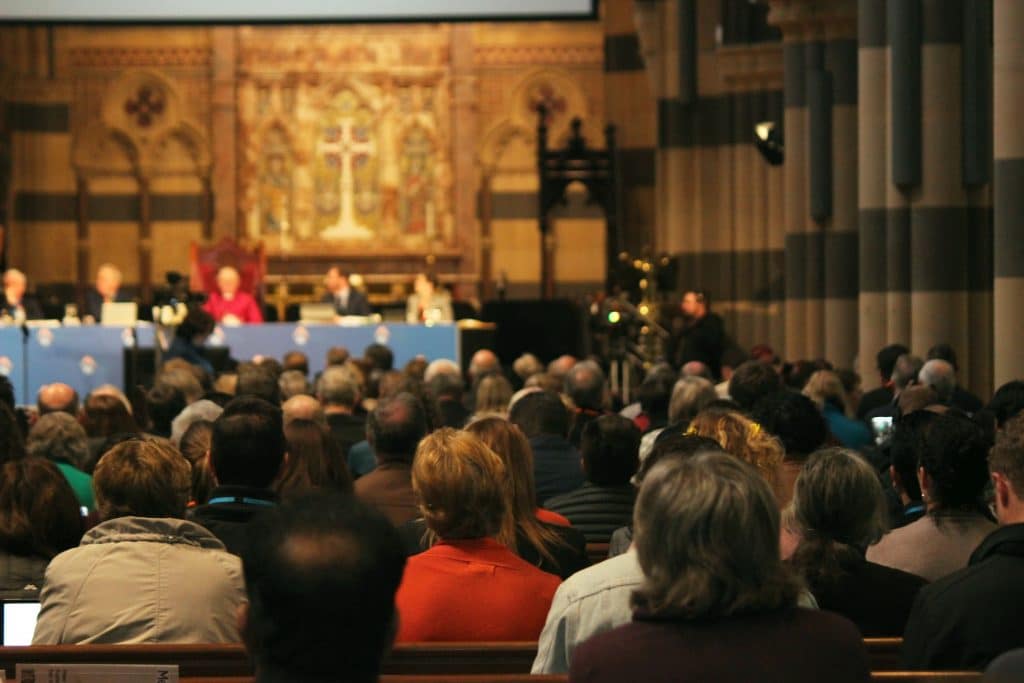
Synod has also voted down an amendment to the 35th clause of the bill – also put by Alex Milner – which would have allowed synod to appoint scrutineers.
2:30pm
The Clergy Bill discussion has finished and we are set to begin discussion on the Archbishop Election Bill now.
I’m about to pass the baton on to my colleague, Elspeth Kernebone, to take us through the next portion of the afternoon. Stay tuned for a story clarifying the core pieces of what happened with the Clergy Bill.
2:25pm
Alex Milner is proposing his last amendment, to cheers from the audience.
This proposal seeks to give a 60 day period in which an amendment to a bill will not take effect if more than 50 members of Synod object to a regulation that has been circulated.
2:18pm
The current amendment proposal relates to the definition of parish ministers. An amendment has passed for clearer definitions.
2:10pm
The president says that the Clergy Bill discussion should take half an hour more.
2:08pm
Alex Milner had another amendment to propose to Clause 17, which is now being discussed:
After subclause (8) insert:
Nothing in this section or this Act derogates
from the rights of a clerk under applicable
law or prevents a parish from ensuring that
the legal obligations owed to a clerk are
satisfied.
The proposed amendment was just lost.
1:55pm
The motion to amend has passed with 238 votes in favour, 118 votes against.
1:50pm
Votes are now being counted for the earlier amendment to the clause in Section 45 which dealt with whether or not an acting vicar can become a permanent vicar within 5 years of service as a locum.
1:45pm
The Venerable Dr Tim Johnson, vicar of St John’s Diamond Creek, proposed an amendment to how parish nomination occurs. His proposal was lost, and with it he withdrew a number of connected amendments.
1:32pm
The business has resumed. Archbishop Freier is making announcements as president regarding timings and voting.
1:27pm
It seems the tech issues from earlier are over, so here is the livestream:
1:20pm
While we wait for the proceedings to recommence, here are some photos from today:
12:30pm
A number of very small amendments are now being proposed. Now we are going to a lunch break, and will resume business at 1:30pm.
12:25pm
Dr Barker disagrees with Dr George’s motion, as he says there may be a conflict of interest when an acting vicar feels compelled to make permanent changes.
The vote is very close, they will need to do a count.
12:22pm
Dr Jenny George is now addressing Clause 45 – to do with whether an acting vicar can become a permanent vicar.
She is proposing that an amendment be made to allow for possible vicars to function in an acting role prior to a permanent appointment. Currently there is no allowance for this in the legislation.
“Let’s not stop sensible choices being made when everyone involved thinks it’s a good idea,” she said.
12:20pm
We are now dealing with Clause 44 – to do with a review of parish ministries.
12:17pm
To catch up on the previous days’ proceedings, here are the links:
12:10pm
Discussion is happening around the change from a review of clergy at 36 months to 24 months in a parish. One argument against the change was that as some clergy are dealing with cross-cultural appointments, more time is needed to understand the culture before normal activities in a parish can be assessed.
The clause has been amended to say 36 months now.
12:05pm
Two very minor amendments to clauses have just been passed. We now seem to have gone off script, so I’m trying to catch up to what the new proposed amendments are.
12pm
There is a great deal of trouble getting people back to their seats. Had no idea Anglicans could be such a rowdy bunch! Must be the ready access to caffeine from the coffee cart.
Alright, back to business! There has just been a vote to keep clauses 18 to 21 as they currently are. That does away with a significant amount of this discussion.
11:45am
The attendees are now on a 5 minute break. We will be back with regularly scheduled programming soon!
11:35am
Kirralee Nicolle here again, a bit more hydrated now! Thanks, Elspeth.
Dr Porter says financial pressures on clergy are high. In order for them to undertake professional development, he says they need more financial support.
11:25am
Hello! Elspeth Kernebone jumping in to give Kirralee Nicolle a quick break (well-deserved! It’s been quite a morning). We’re working through amendments to the Clergy Bill – Alex Milner is speaking to one relating to professional development, supervision and appraisal, and I am trying to catch myself up.
Alex Milner says he’s lay, but he constantly appreciates how hard-working clergy are. That didn’t get much of a reaction from the audience, but his comment about salaries being not fantastic certainly did.
11:20am
Alex Milner is proposing more amendments to the bill, the first being:
For subclause (2) substitute:
An appointment to the office of assistant
bishop may not occur without the
concurrence of both the Archbishop and
the Council of the Diocese.
11:18am
The first amendment by Ms Arnold-Moore was lost, and she has now withdrawn all following amendments.
11:15am
“We must be willing to hold one another lovingly to account,” an attendee has said in opposition to Arnold-Moore’s amendment. I missed the name unfortunately.
11:10am
Dr Barker said that he dislikes the word suitability, as it could denote that a vicar is unsuitable.
“I don’t think the word review needs to be read with a secular management lens at all,” he said.
11:05am
Reverend Colleen Arnold-Moore has presented two amendments to the bill as follows:
For the definition of “appointment
continuation review” substitute
“suitability review means a review
conducted under subdivision 2 of
Division 1 of Part 5”.
• For the definition of “appointment
continuation review committee”
substitute “suitability assessment
committee means the committee
constituted under section 34”.
For “an initial post-appointment review”
substitute “a suitability review”
She said this proposed amendment was to address what she sees as an issue where vicars are appointed and reviewed based on secular corporate terms. She said she believes the word suitability better fits a clergy appointment.
11:02am
Alex Milner has presented a series of amendments to the bill. Still catching up on where they landed.
10:55am
To catch up on the previous days’ proceedings, here are the links:
10:52am
If you have anything to let us know, or can provide fact-checking, please email us at editor@melbourneanglican.org.au. We appreciate your input!
10:50am
“Jenny George, yes, I relish amendments too,” Bishop Taylor said.
It’s a day for relishing amendments!
The bill has been voted in for discussion. Get ready!
10:41am
After all that discussion on whether there should be discussion, Bishop Taylor is now able to speak before the bill can be voted to be brought in for discussion.
10:40am
Dr Chris Porter from Merri Creek Anglican Fairfield has defended Dr George’s proposal.
“We need to be able to debate amendments, even if we reject them,” he said. “We as a Synod are the ones who are going to be living with this legislation long-term.”
10:35am
There has been a request – didn’t catch the name – that the bill not have amendments discussed.
Lay representative Dr Jenny George, who was part of drafting the bill, is speaking to defend making amendments to the Clergy Bill.
She says she does not think that Synod should feel duty-bound to pass just what the drafters have written.
10:30am
Dr Paul Barker has just presented from Clause 23 on, but I missed the full number of clauses on which he is presenting amendments. Will update further when it becomes clearer.
He also voiced his support for changes to the Archbishop Election Bill, following on from Father Alex Ross’ comments last night.
10:25am
Here are the clauses to which Bishop Taylor is proposing amendments:
Clause 13 concerns the licensing of clergy.
Those who must be licensed are: vicars, intentional interim vicars,
curates, and parish ministers receiving 0.5 or more of the stipend
established by the Archbishop in Council.
Those who may be licensed are: parish ministers receiving less than 0.5 of
the stipend established by the Archbishop in Council.
Those who may not be licensed are: an acting vicar and an honorary
parish minister.
Clause 14 provides that a clerk holds office for the term of their appointment, but if
there is no definite term then until they turn 70.
Clause 15 requires clerks holding a clergy authorization to comply with the
requirements regarding professional development, supervision and
appraisal determined by the Archbishop in Council. The Archbishop in Council can adopt the requirements recommended by the Standing Committee of General Synod.
Clause 16 provides that the Division covers all clergy holding a clergy authorization
other than those employed by bodies other than MADC (such as schools)
and the Cathedral.
Clause 17 requires the Archbishop in Council to determine the remuneration,
benefits, allowances and working conditions for the purposes of this
Division.
These include the other offices established by the Archbishop under
section 11, and any alternative payments or compensation for particular
officeholders in parish (such as archdeacons and area deans).
A determination must be reviewed annually and be publicly available.
Subclause (7) provides that a clerk is entitled to the remuneration and
working conditions determined in relation to them, but subclause (8) will
have the effect that a vicar, parish minister or curate may have more
generous remuneration or working conditions.
Clause 18 requires the Archbishop in Council to establish a committee through
which to gain and give advice regarding a determination.
The committee must have two members of the Archbishop in Council
(one clerical, one lay), two members of the clergy covered by a
determination, two churchwardens, an expert in professional remuneration
and an expert in industrial agreements and conditions of employment.
Subclause (3) requires the committee in turn to obtain professional advice,
and the advice of the MADC, to solicit submissions from affected
stakeholders including affected clergy and laity, and (at its discretion) to
meet with people who have made submissions.
The Committee must provide all the material that it has gathered to the
Archbishop in Council at the time of making its recommendation.
As under the current legislation, members of the Archbishop in Council
are not conflicted in making a determination, but must not in the debate
refer to how they would personally be affected by the determination.
Clause 19 provides for a recommendation to be made to the Archbishop that a
process commence to determine whether a clerk is unable to perform their
duties for more than six months be reason of physical or mental
incapacity.
Clause 20 provides that where this is a recommendation under section 19, the
Archbishop may commence a process to determine whether the clerk is
incapacitated and suspend their licence for up to 30 days.
Clause 21 provides that where this process is commenced the MADC must obtain a
medical report at its expense.
Clause 22 allows the Archbishop to suspend a clerk’s licence for up to a year or
remove it where the medical practitioner considers that the clerk is by
reason of physical or mental incapacity unable to perform the duties of
their position or office for more than six months. It preserves the clerk’s
eligibility for sick leave despite the removal or suspension of their clergy
authorization.
Overwhelmed yet? Look, same.
10:15am
Sorry for the delay, we just lost WiFi connection here, so I’m hotspotting from my phone.
Bishop Alison Taylor has begun presenting the proposed amendments, stating that there has not been a comprehensive review of clergy legislation in over 70 years.
“What we have at present is a patchwork of law,” she said.
Bishop Taylor said that now that there are over 600 clergy in the diocese, the context has changed dramatically. She said another factor in the changes was the pandemic.
“COVID and lockdowns have made it financially difficult for many of our parishes,” Bishop Taylor said.
“Our legislation for clergy is out of date and we are in changing times with new demands.”
She also said the passing of this bill will mean the repeal of several other acts.
Clauses about vicars, their appointment and review are set to be discussed by Dr Paul Barker.
10am
It turns out rough counting is not my strong suit – I guess they never covered that in journalism class. Attendee numbers are between 400 and 500, not 1000.
Some notes on the Clergy Bill to help you get prepared – the mover on the motion is the Right Reverend Alison Taylor, and the seconder is the Right Reverend Dr Paul Barker. The amendments are set to include both an explanatory memorandum and a bill.
Alright, we are about to hear from Bishop Alison Taylor already.
9:50am
Prayers are being offered for those experiencing homelessness, flooding, famine and disadvantage.
Business is set to resume at 10:30am. Enough time to grab a caffeinated drink and a spot in the sunshine with good WiFi.
9:45am
For those tuning in from home, the livestream is not functioning currently. Hold tight – troubleshooting is happening.
And it just started working. Try refreshing your screen if it still isn’t functional.
9:40am
Synod Day 4 has begun with a worship service, and a rousing rendition of Great is Thy Faithfulness. It’s fascinating to see the sheer number of attendees – I’m guessing over 1000.
9:30am
Good morning all, welcome to the big day of in-person Synod meetings here at St Paul’s Cathedral. Journalist Kirralee Nicolle here to take you through the proceedings.
Last night my colleague Jenan Taylor covered a productive evening, with the five bills below being passed and solemnised as acts:
- Constitution Amendment (Mandatory Suspension) Canon 2022 (Assent) Bill 2022
- Constitution Amendment (Mandatory Deposition) Canon 2022 (Assent) Bill 2022
- Episcopal Standards (Child Protection) Amendment Canon 2022 (Adoption) Bill
- Safe Ministry Legislation Amendments Canon 2022 (Adoption) Bill 2022
- Diocesan Legislation Amendment (Conduct of Synod, Electronic Meetings and Other Matters) Bill 2022
But there is still work to be done. One bill from last night, the Archbishop Election Bill was shelved for further discussion today. This will follow discussion on the Clergy Bill, which will take up the largest portion of the day. These two topics should take us to 4pm, and let’s not get too ahead of ourselves, shall we?
Alright, let’s crack on!
For more faith news, follow The Melbourne Anglican on Facebook, Twitter, or subscribe to our weekly emails.






